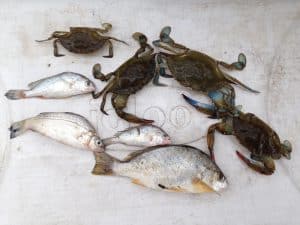Share this article
Impacts of Deepwater Horizon spill ripple through food web
Seven years after the Deepwater Horizon drilling rig exploded in the Gulf of Mexico, wildlife throughout the food chain is still impacted.
In a new study published in Frontiers in Ecology and the Environment, a team of researchers from the Coastal Waters Consortium looked at which species could benefit from more conservation efforts after the spill, based on their importance in the food chain and how they were impacted by oil.

Blue crabs and assorted fish including spot are a few of the species researchers studied to better understand how the food chain has been affected by the Deepwater Horizon oil spill.
©Michael Polito, LS
“There’s a lot of published literature about oil impacts on salt marsh organisms such as fish and birds,” said Olaf Jensen, an associate professor in the Department of Marine and Coastal Sciences at Rutgers University and a co-author of the study. “What there haven’t been are attempts to look at the indirect impacts throughout the food web.”
This means that while an organism might not be directly affected by the oil, they can face negative effects if their food source is.
The research team completed a literature review to look at impacts of oil on populations of various species. These included oil sensitivity studies conducted on organisms throughout the food web that were affected by the Deepwater Horizon spill in the salt marshes of Louisiana.
The researchers then created a food web of species in the salt marshes which connected species to one another based on predator-prey relationships. They determined how the impact on the animals from the oil spill would affect the rest of the food web.
Jensen and his team distinguished which species were critically resilient, meaning they were highly connected in the food web and relatively insensitive to oil. These species included carnivorous marsh fishes such as killifishes (Cyprinodontiformes). They also determined which species were critically sensitive, meaning they were sensitive to oil and very connected in the food web, so their loss would affect other species in the food chain as well. “Those are the ones we want to prioritize for protection and restoration efforts,” Jensen said. Some of these critically sensitive species include wading birds such as herons.
However, species such as the blue crab (Callinectes sapidus) were much harder to categorize, Jensen said. While the blue crab is highly connected in the food web, there are conflicting studies about whether or not they’re sensitive to oil. Jensen suggests focusing research on species like these since they have a high connectivity in the food web.
“We often are faced with choices about which species to focus protection and restoration efforts on, and this is one way of making those difficult decisions,” Jensen said.
Header Image: Louisiana State University research associate Tyler Mauney walks through the salt marsh in Port Sulfur, La. ©Michael Polito, LSU








